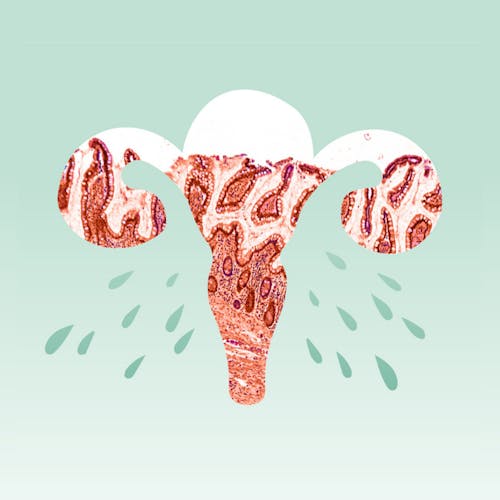This website uses cookies to enhance the user experience. By using Yoppie you are agreeing to our use of cookies.
Period Blood Clots, A Friendly Guide
Written by Yoppie
12 Jul 2021
What are period blood clots?
Ew. Why do they happen?
What should I be looking out for?
What could an abnormal clot be?
What will my GP want to know?
Got a crime scene in your pants? Not to worry, we’re diving into all things period blood clots right here. What these little things actually are, why they happen, what you need to watch out for, and when to speak to a medical pro. Let’s get you all clot up.
What are period blood clots?
Firstly, there’s a difference between ‘normal’ menstrual clots and abnormal ones. We’ll talk more about abnormal clots below, but both kinds are jelly-like blobs of what seems like solid blood. Think a strawberry gummy sweet that’s been left to melt in the sun. Or one of those lumpy bits you find in the jam jar.
They can be either bright red or darker in colour, and normal clots are usually no larger than a penny in size, and don’t come out very often.
Ew. Why do they happen?
When you get your period, the uterine lining gets thicker throughout the month thanks to increased estrogen. This lining is made up of blood, muscle, tissue and other byproducts of the menstruation process.
When this mixture descends into the uterus to be expelled, your clever body knows it’s time to break down the thickened blood and tissue, so it releases anticoagulants that work to thin the mixture, in order for it to come out of the vagina easily.
When you have a heavy flow, the body doesn’t always get a chance to go through this procedure before the blood comes out, and clots are the result. These aren’t dangerous, but there are some things to watch out for that may mean blood clots are of concern.
What should I be looking out for?
Heavy periods are common, but passing particularly large clots frequently may mean these are actually ‘abnormal’, and it’s worth looking into this to ensure everything is fine, and there are no medical issues that must be addressed. You’ll want to look out for clots that:
- Are bigger than a penny in size
- Are occurring very often
- Come with an abnormally heavy flow (if you’re changing your pad or tampon every 1-2 hours for a long time, this is heavy)
- Come with significant pain
What could an abnormal clot be?
Abnormal menstrual clots aren’t always something to freak out about, but in rare cases they can be a sign that something is not right and must be checked by a doctor. Here are a few conditions that could be the underlying cause of excessive menstrual clots:
Uterine polyps or fibroids
These can cause blockages in the uterus that stop it from contracting normally. When this happens, it is unable to force blood out as it should, and so blood exits the vagina slowly, meaning it has more time to form larger clumps of tissue.
Uterine polyps and fibroids are not cancerous, but they can cause other health conditions if not managed appropriately. They are typically made up of either endometrial or muscular tissue growing inside the uterine wall, which can cause lower back pain, pain during sex, bloating, fertility issues, and whaddaya know… blood clots.
Endometriosis or adenomyosis
Endo is a big culprit of painful, heavy periods, when tissue from the uterine lining grows outside of the uterus where it shouldn’t be. This often causes a variety of symptoms, including pain and cramping in the pelvis and/or lower back, very heavy or painful periods, pain during sex, and fertility issues. Adenomyosis is known to cause similar issues, and can also result in menstrual clotting.
Enlarged uterus
If you have just given birth, your uterus may stay slightly larger than it was before you were pregnant, which will offer more space for period blood to pool in. When this happens, blood clots can occur.
Bleeding disorders
If you have a bleeding disorder, you may experience a heavy menstrual flow, as the coagulation that the uterine lining requires to stop menstrual blood doesn’t always work as it should. If you have a platelet function disorder or a condition such as Von Willebrand Disease (VWD), these could result in abnormally heavy menstruation and clotting.
Miscarriage
While abnormal blood clots are something to be checked with your GP sooner rather than later, they wouldn’t count as a medical emergency unless you find yourself in intense pain.
Light bleeding is common during pregnancy, but should still be checked by a doctor. However, if you experience heavy bleeding and blood clots while pregnant, you should seek immediate medical help, as this could be a sign of miscarriage.
What will my GP want to know?
Speaking to your GP about clots can be difficult, as you’re not exactly able to show them what you are seeing or experiencing. When discussing blood clots, a healthcare professional might ask you questions about:
- How long your period normally lasts, and how heavy your flow is
- If you have noticed changes in your flow over time
- If you have been pregnant before
- If you have ever had pelvic surgery
- If you use birth control or other medications, and what kind
Depending on their analysis of your situation, they may recommend a blood test to look at your thyroid function and any hormonal imbalances or anaemia, a pap test where cells are tested from the cervix to find out causes of heavy bleeding and/or clots, or an ultrasound to discover issues like fibroids or endometriosis.
They may suggest further tests or surgical procedures, but this only happens in extreme cases, so don’t worry about going to your GP about clots - it’s always better to check!
Got a question about period blood clots? We’re all ears! Ask away it in our private Facebook group or drop us a note on Insta @itsyoppie. Don't forget that our personalised period box can get organic tampons, PMS supplements and more delivered easily and regularly through your letterbox, so that's one load off your mind about everything that's going on down there.
Section jump
Back to top
Subscribe To Our Newsletter
YOPPIE





© 2026 Yoppie is a registered trademark of Phlo Technologies Ltd.
Yoppie's supplements are not a substitute for a varied diet and healthy lifestyle and are not intended to diagnose, treat, or cure any disease. If you are pregnant, breastfeeding, have a medical condition or are under medical supervision, please consult with your doctor before taking any of our products.






